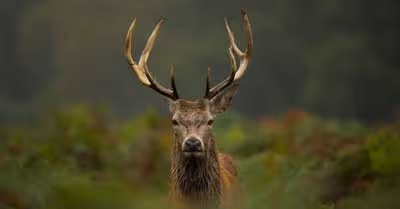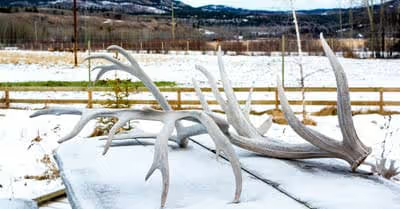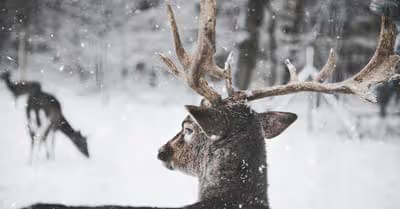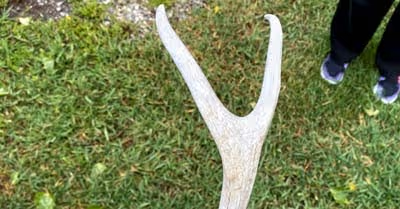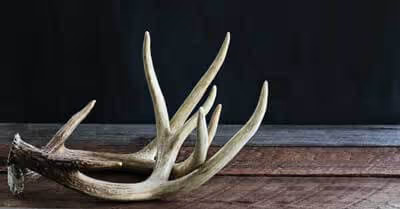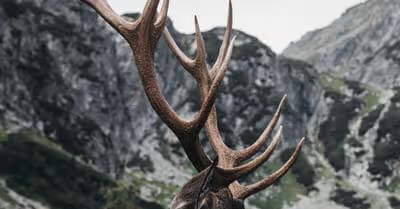Table of Contents
Should I give deer shed to my dog?
Every year, deer shed their antlers, and you can find these shed antlers outdoors. While people keep the best deer shed they find, people often give less impressive pairs of antlers to dogs.
People sometimes get deer antlers for their dogs by hunting rather than finding sheds. This can be the best way to go because these antlers are the freshest. However, shed antlers can still be fresh enough that a dog will love them.
While I give deer antlers to my dog, I take safety precautions. I remove sharp points before I give the shed antler to my dog. You cannot trust a dog not to eat anything sharp.
As long as you remove the sharp points, it is mostly safe for a dog to chew on a large piece of antler. A small piece is much more dangerous because a dog can choke on it. Sometimes a dog can fracture a tooth by chewing on an antler too hard, but this is uncommon.
Should your dog eat deer shed for health reasons?
Yes, deer antlers are nutritious enough that chewing on them can keep your dog healthy. Antlers are very high in calcium and phosphorus, so much so that even a little chewing can help your dog get its vitamins.
Dogs, especially growing dogs, need a lot of calcium and phosphorus, so deer antlers are well suited to a dog's nutritional needs. Ideally, a dog should get a lot of both calcium and phosphorus in its diet - it can be harmful to get too much of one and very little of the other.
Phosphorus is used by every cell in either a dog's body or a human's body. More than anything else, phosphorus is good for building and maintaining strong bones and teeth. Phosphorus helps keep the heartbeat regular, keeps the kidneys working properly, and helps the body create new cells.
Calcium is best known as a vitamin that strengthens bones and teeth, but it has other uses as well. Calcium is important for a dog's digestion, muscular function, hormones, and cartilage formation. Since deer antlers are basically made of calcium and phosphorus, they are very healthy for dogs to chew.
If your dog chews deer shed, it will also get zinc, magnesium, and sulfur, although these vitamins are not in as large of quantities as calcium and phosphorus. These vitamins are necessary for a dog's hormones and immune system, plus its ability to heal.
Deer antlers are good for dogs dental health
Dogs keep their teeth clean by chewing. When a dog chews on a chew toy, it cleans plaque off of its teeth.
Many people buy dental treats for their dogs. These treats do work but are full of calories and are not good for a dog that is too heavy. Giving a dog deer shed to chew on might be a better idea.
For most dogs, deer antlers make better dental chew toys than the antlers of other animals such as elk. Elk antlers are soft, so bigger dogs can chew them apart easily. Deer antlers can last for a while with a big dog chewing on them.
Some dogs can break their teeth chewing antlers
One point against giving dogs deer sheds to chew on is that they can fracture their teeth in some cases. Deer antlers are hard, and a dog does not always know better than to chew harder than it should. If you know your dog is an aggressive chewer, maybe giving them anything hard to chew on is not a good idea.
At first, you might want to supervise your dog when it is chewing on an antler. If your dog seems to be fine and not chewing highly aggressively, you might let your dog chew on an antler unsupervised. Some people always supervise their dogs when they chew on antlers.
When giving a deer shed to a dog, the biggest risk is choking. A dog can easily die if it swallows something it shouldn't have.
Thankfully, this is not likely and is not a good reason to keep your dog away from deer antlers. A bone can easily be more dangerous than an antler because the bone can break into small fragments.
The only real danger is that the dog will eventually chew a piece of antler down to a small enough size that the dog can swallow it. Keep track of what your dog is chewing on, and don't let this happen.
Get rid of a piece of antler before it gets dangerously small. Your dog should not be chewing on anything that it can entirely fit into its mouth.
Do deer sheds smell bad?
Usually, they do not, so you can keep them indoors if you want to. Antlers are dry rather than greasy and odorless. Antlers may start to smell if your dog has been chewing on them for a long time, so you may want to keep the antlers outside.
Are antlers ok for puppies?
Yes, and a puppy may appreciate an antler when it is dealing with the discomfort of its adult teeth growing in. The only risk is that the puppy can swallow a small piece of antler, which could be fatal. Make sure that the puppy does not have a piece small enough to swallow, as puppies are particularly vulnerable to choking.
Do all dogs love deer antler dog chews?
Dogs are as different from each other as people are, so not every dog will chew on an antler. If you cut an antler open and expose the softer center, it may like the antler better. Some dogs won't chew antlers at all, so you need to know about alternatives.
Horns
While animals shed antlers, horns stay on the animals for life. Horns are a great choice because they are as safe for dogs to chew on as antlers. You can buy buffalo horns, sheep horns, and bull horns for your dog to chew on.
Horns are nutritious and do not have a lot of calories or any artificial additives. While horns are reasonably safe, they have the same safety risks as antlers. Your dog can break a tooth on an antler, or, if it chews it down to a small piece, swallow and choke on it.
Cow hooves
Cow hooves are less popular for dog owners than they used to be, but you can still get them for your dog to chew on. Cow hooves are great for a dog's teeth and are nutritious. However, they can break apart and cut a dog's mouth and stomach.
Knuckle bones
Knuckle bones are another nutritious choice that you might want to avoid for safety reasons. Unlike antlers, they can break apart in chunks that a dog can swallow.
A dog probably won't choke, but bone splinters can cause internal damage. At least, you should supervise your dog if it is chewing on knuckle bones or cow hooves.
Dental chews
These are more popular than antlers or anything else. They are great for a dog's dental health.
Despite their dental health benefits, dental chews often contain unhealthy ingredients. Many of them include vitamins and minerals, but many of them do not, so antlers are generally more nutritious. You will also have to replace dental chews more often than antlers.
Rawhide chews
Rawhide chews are safer than cow hooves or knuckle bones. However, a dog cannot digest rawhide, so it can obstruct the dog's digestive system if the dog swallows any. You may want to supervise a dog with these treats also.
Beef tendons
Beef tendons are both natural and relatively safe. While most tendons in cows are ground up and made into dog food, some are sold as chew toys for dogs.
Beef tendons are a good source of protein and are a long-lasting chew. They are not too high in calories and do not have artificial additives. Unlike rawhide chews, beef tendons are easy for a dog to digest.
While the risk of choking is small - beef tendons are one of the safest options - it is still risky for a dog to swallow a hard piece of beef tendon when it becomes small enough. Take them away from your dog when they become small enough to swallow.
Recent Articles



